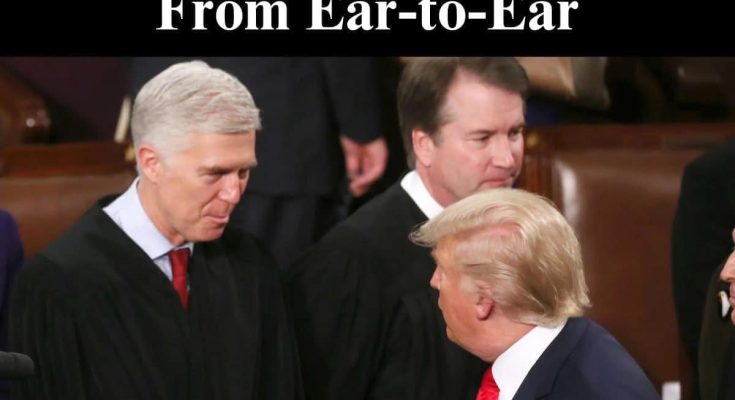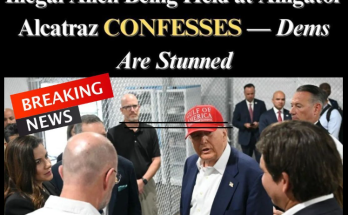The Supreme Court agreed on Thursday to reinstate a federal anti-money laundering law at the federal government’s request, allowing it to remain in effect while legal challenges continue in lower courts. This decision temporarily halts an injunction that had blocked the Corporate Transparency Act (CTA), a law requiring millions of businesses to disclose personal information about their owners.
Justice Ketanji Brown Jackson was the only justice to dissent.
The Biden-era Justice Department had urged the Supreme Court to intervene, filing an emergency request last month. The ruling came just three days after President Trump’s inauguration. Despite Trump’s past opposition to the law during his first term, his Justice Department did not withdraw the application.
The CTA, passed in early 2021 as part of an annual defense bill, mandates that small business owners submit details such as birth dates and home addresses to the Financial Crimes Enforcement Network. The law is intended to combat money laundering and other financial crimes, but it has drawn strong opposition from business groups and anti-regulatory advocates who have fought to delay its implementation.
The case now returns to the 5th U.S. Circuit Court of Appeals, which will determine whether the Justice Department can justify the law as a constitutional exercise of Congress’s authority over interstate commerce. In the meantime, the Supreme Court’s decision allows the government to begin implementing the disclosure requirements.
Jackson, who was appointed to the court by President Biden, dissented, arguing that the government had failed to demonstrate an urgent need for the Supreme Court’s involvement. She noted that the 5th Circuit was already expediting the appeal and that the government had delayed implementing the law for nearly four years on its own.
“The Government deferred implementation on its own accord—setting an enforcement date of nearly four years after Congress enacted the law—despite the fact that the harms it now says warrant our involvement were likely to occur during that period,” Jackson wrote. She argued that there was no clear reason why a further delay would cause significant harm.
The Justice Department, however, insisted that postponing the law would be damaging. Solicitor General Elizabeth Prelogar, writing in the government’s emergency application, contended that the injunction “prevents the government from executing a duly enacted Act of Congress, impedes efforts to prevent financial crime and protect national security, undermines the United States’ ability to press other countries to improve their own anti-money laundering regimes, and severely disrupts the ongoing implementation of the Act.”
The Supreme Court declined a separate request from Prelogar to take up a broader issue concerning the power of federal district judges to block laws nationwide. The growing trend of “universal injunctions,” used by both Democratic and Republican administrations to halt laws and regulations, has become a contentious legal issue. While the court chose not to address it in this case, Justice Neil Gorsuch, Trump’s first Supreme Court appointee, suggested that it should.
“I agree with the Court that the government is entitled to a stay of the district court’s universal injunction. I would, however, go a step further and, as the government suggests, take this case now to resolve definitively the question whether a district court may issue universal injunctive relief,” Gorsuch wrote in a concurring opinion.
The legal challenge to the CTA was brought by a coalition including a firearms dealer, a dairy farm, an information technology company, one of its owners, the National Federation of Independent Business (NFIB), and the Libertarian Party of Mississippi. They argued that Congress had exceeded its constitutional authority in passing the law.
The emergency request from the Biden administration followed a series of conflicting decisions from the conservative-leaning 5th Circuit Court of Appeals, which had left in place a lower court’s injunction blocking the law until a full appeal is resolved.
In their Supreme Court filings, the plaintiffs pointed to the political timing of the case, highlighting Trump’s return to office. During his final days as president, Trump had vetoed the defense bill containing the corporate disclosure requirement. Congress then overrode his veto, marking the only time it had done so during his presidency. The plaintiffs suggested that the urgency to enforce the law stemmed from concerns that Trump’s administration might attempt to delay or block its implementation.
“A more likely explanation for its newfound urgency is that the incoming administration might delay the deadline, which would be feasible only if it hasn’t yet passed. Thus, the charge to bring the mandate into force,” the plaintiffs’ attorneys wrote.
“Once existing companies have been forced to disclose their beneficial owners, the bell cannot be unrung.”
The government’s emergency application also faced strong opposition from business organizations such as the National Small Business Association, the National Association of Wholesaler-Distributors, and the National Retail Federation. More than a dozen Republican members of Congress, along with Advancing American Freedom, a conservative advocacy group founded by former Vice President Mike Pence, also voiced their opposition.
In a friend-of-the-court brief, 25 Republican state attorneys general warned that the case was part of a larger power grab by the federal government. “Make no mistake: this stay application constitutes an aggressive play for vast power over American small businesses (and others),” they wrote.
With the Supreme Court’s ruling in place, the CTA will now move forward while the legal battle continues in the lower courts.




1 win сайт [url=https://1win6001.ru/]1 win сайт[/url] .
most bet [url=http://mostbet6006.ru/]most bet[/url] .
1вин [url=https://1win6046.ru]https://1win6046.ru[/url] .
Купить диплом академии !
Покупка диплома любого университета РФ у нас – надежный процесс, поскольку документ заносится в реестр. Выгодно купить диплом о высшем образовании [url=http://diplomc-v-ufe.ru/kupit-nastoyashij-diplom-3/]diplomc-v-ufe.ru/kupit-nastoyashij-diplom-3[/url]
Заказать диплом можно через официальный сайт компании. [url=http://jobs.recruithub.africa/profile/ambergabriele4/]jobs.recruithub.africa/profile/ambergabriele4[/url]
Мы можем предложить дипломы любой профессии по выгодным ценам. Купить диплом Новочеркасск — [url=http://kyc-diplom.com/geography/novocherkassk.html/]kyc-diplom.com/geography/novocherkassk.html[/url]
Купить диплом любого ВУЗа!
Заказать диплом об образовании. Приобретение диплома ВУЗа через проверенную и надежную компанию дарит ряд плюсов. Данное решение позволяет сберечь время и серьезные средства. joboptimizers.com/employer/eonline-diploma
equilibrado de turbinas
Equipos de ajuste: fundamental para el rendimiento fluido y óptimo de las maquinarias.
En el ámbito de la avances avanzada, donde la productividad y la fiabilidad del sistema son de máxima importancia, los sistemas de ajuste tienen un función fundamental. Estos sistemas especializados están concebidos para calibrar y regular partes rotativas, ya sea en equipamiento manufacturera, automóviles de desplazamiento o incluso en dispositivos domésticos.
Para los expertos en conservación de equipos y los técnicos, manejar con aparatos de ajuste es crucial para garantizar el operación uniforme y estable de cualquier sistema rotativo. Gracias a estas alternativas modernas innovadoras, es posible disminuir sustancialmente las movimientos, el estruendo y la esfuerzo sobre los soportes, aumentando la duración de elementos valiosos.
También significativo es el función que desempeñan los sistemas de ajuste en la soporte al cliente. El ayuda experto y el soporte regular aplicando estos aparatos posibilitan ofrecer servicios de excelente excelencia, incrementando la contento de los compradores.
Para los titulares de emprendimientos, la aporte en unidades de ajuste y detectores puede ser esencial para incrementar la productividad y rendimiento de sus sistemas. Esto es particularmente significativo para los dueños de negocios que gestionan reducidas y intermedias organizaciones, donde cada detalle vale.
Asimismo, los equipos de balanceo tienen una vasta aplicación en el área de la fiabilidad y el gestión de calidad. Permiten localizar posibles problemas, reduciendo reparaciones onerosas y perjuicios a los dispositivos. Más aún, los resultados obtenidos de estos dispositivos pueden utilizarse para optimizar procedimientos y mejorar la reconocimiento en sistemas de búsqueda.
Las zonas de aplicación de los equipos de equilibrado cubren numerosas ramas, desde la elaboración de bicicletas hasta el seguimiento ambiental. No influye si se refiere de grandes manufacturas productivas o limitados talleres de uso personal, los dispositivos de calibración son indispensables para garantizar un operación eficiente y sin presencia de detenciones.
Espectro de vibracion
Equipos de ajuste: clave para el operación fluido y eficiente de las equipos.
En el campo de la ciencia avanzada, donde la rendimiento y la confiabilidad del equipo son de suma importancia, los sistemas de calibración desempeñan un función crucial. Estos dispositivos especializados están desarrollados para equilibrar y estabilizar elementos móviles, ya sea en herramientas productiva, transportes de traslado o incluso en electrodomésticos de uso diario.
Para los técnicos en soporte de dispositivos y los técnicos, utilizar con sistemas de equilibrado es crucial para asegurar el desempeño suave y seguro de cualquier aparato móvil. Gracias a estas soluciones innovadoras modernas, es posible minimizar notablemente las vibraciones, el sonido y la carga sobre los soportes, mejorando la tiempo de servicio de partes valiosos.
De igual manera importante es el papel que tienen los sistemas de ajuste en la atención al usuario. El asistencia técnico y el conservación permanente aplicando estos equipos posibilitan dar prestaciones de gran estándar, aumentando la satisfacción de los usuarios.
Para los propietarios de empresas, la inversión en sistemas de equilibrado y detectores puede ser esencial para optimizar la rendimiento y productividad de sus equipos. Esto es particularmente importante para los inversores que gestionan modestas y medianas negocios, donde cada detalle cuenta.
Asimismo, los sistemas de calibración tienen una gran implementación en el campo de la prevención y el monitoreo de nivel. Facilitan localizar potenciales defectos, previniendo arreglos costosas y problemas a los sistemas. Incluso, los resultados recopilados de estos dispositivos pueden usarse para maximizar sistemas y potenciar la reconocimiento en plataformas de consulta.
Las campos de implementación de los aparatos de balanceo cubren diversas áreas, desde la elaboración de transporte personal hasta el control de la naturaleza. No afecta si se trata de grandes fabricaciones manufactureras o pequeños establecimientos caseros, los equipos de ajuste son indispensables para asegurar un operación eficiente y libre de interrupciones.
seo интенсив [url=http://kursy-seo-12.ru/]http://kursy-seo-12.ru/[/url] .
курсы по seo [url=www.kursy-seo-12.ru]курсы по seo[/url] .
написать курсовую на заказ [url=http://kupit-kursovuyu-5.ru/]написать курсовую на заказ[/url] .